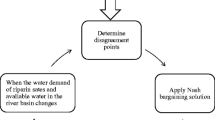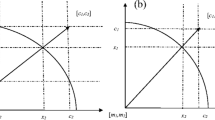Abstract
This article is focused on the problem of river sharing in the presence of pollution as a negative externality between two riparian states (agents). In this paper, a market-based contract mechanism is presented; it can address the issue of negative externality imposed by an upstream agent on the downstream agents while sharing a river. The proposed mechanism incorporates a penalty for pollution and also incentives for trading water between upstream and downstream agent. The mechanism introduces a new concept of negative water as penalty against pollution for an upstream agent in a contract for water sharing. The contract is analyzed by a market-based bargaining model to determine a negotiated treaty between the upstream agent and the downstream agent. The results show the characterization of agents with regard to agreement points for negotiated treaty. Also, it shows that an equilibrium exists for a unique solution that makes both the agents better off. The model discussed in this paper can be easily applied to any transboundary river conflict where pollution plays an important role.




Similar content being viewed by others
Notes
Absolute Territorial Sovereignty (ATS) or The Harmon Doctrine: It suggests a riparian state has full control over the over the water yields within her territory, and can utilize those waters without considering dependent livelihood or claims of the other co-riparian agents.
Absolute Territorial Integrity (ATI): This principle considers downstream riparian states to demand the the flow of the river from an upper riparian state without compromising the quantity or quality.
References
Giordano, M.A., Wolf, A.T.: Sharing waters: Post-rio international water management. Nat. Resour. Forum 27(2), 163–171 (2003). https://doi.org/10.1111/1477-8947.00051
Barret, S.: Conflict and Cooperation in Managing International Water Resources. Policy Research Working Paper 1303, World Bank, Washington (1994)
Kilgour, D.M., Dinar, D.: Are stable agreements for sharing inter-national river water now possible? Policy Research Working Paper, WorldBank, Washington (1474) (1995)
Ambec, S., Sprumont, Y.: Sharing a river. J. Econ. Theory 107, 453–462 (2002)
Wang, Y.: Trading water along a river. Math. Soc. Sci. 61, 124–130 (2011)
Dinar, A., Blankespoor, B., Dinar, S., Kurukulasuriya, P.: Does precipitation and runoff variability affect treaty cooperation between states sharing international bilateral rivers? Ecol. Econ. 69(12), 2568–2581 (2010)
Brink, R.V.D., Laan, G.V.D., Moes, N.: Fair agreements for sharing international rivers with multiple springs and externalities. J. Environ. Econ. Manag. 63, 388–403 (2012)
Ambec, S., Ehlers, L.: Sharing a river among satiable agents. Games Econ. Behav. 64, 35–50 (2008)
Ansink, E., Weikard, H.P.: Contested water rights. Eur. J. Political Econ. 25, 247–260 (2009)
Ni, D., Wang, Y.: Sharing a polluted river. Games Econ. Behav. 60, 176–186 (2007)
Dong, B., Ni, D., Wang, Y.: Sharing a polluted river network. Environ. Resour. Econ. 53, 367–387 (2012)
Alcalde-Unzu, J., Gomez-Rua, M., Molis, E.: Sharing the costs of cleaning a river: the upstream responsibility rule. Documentos de trabajo - lan gaiak departamento de economia - universidad publica de navarra, Departamento de Economia - Universidad Publica de Navarra (2013)
Rebille, Y., Richefort, L.: Sharing water from many rivers. hal-00678997, HAL Working Paper (2012)
Chander, P., Tulkens, H.: The core of an economy with multilateral environmental externalities. Int. J. Game Theory 26, 379–401 (1997)
Coase, R.: The problem of social cost. J. Law Econ. 1, 1–44 (1960)
Gerard, v.d.L., Moes, N.: Transboundary externalities and property rights: an international river pollution model. Tinbergen Institute Discussion Paper No. 12-006/1. Available at SSRN: http://dx.doi.org/10.2139/ssrn.1988838 (2012)
Houba, H., van der Laan G., Y., Z.: Asymmetric Nash solutions in the river sharing problem. Tinbergen Institute Discussion Pare TI 2013-051. (2013)
Fu, Y., Zhang, J., Zhang, C., Zang, W., Guo, W., Qian, Z., Liu, L., Zhao, J., Feng, J.: Payments for ecosystem services for watershed water resource allocations. J. Hydrol. 556, 689–700 (2018). https://doi.org/10.1016/j.jhydrol.2017.11.051
Shi, G.M., Wang, J.N., Zhang, B., Zhang, Z., Zhang, Y.L.: Pollution control costs of a transboundary river basin: Empirical tests of the fairness and stability of cost allocation mechanisms using game theory. J. Environ. Manag. 177, 145–152 (2016). https://doi.org/10.1016/j.jenvman.2016.04.015
Hou, D., Sun, P., Yang, G.: Sharing the costs of cleanup polluted river: upstream compensation method. Econ. Lett. (2020). https://doi.org/10.1016/j.econlet.2020.109473
Jiang, K., You, D., Li, Z., Shi, S.: A differential game approach to dynamic optimal control strategies for watershed pollution across regional boundaries under eco-compensation criterion. Ecol. Indic. 105, 229–241 (2019). https://doi.org/10.1016/j.ecolind.2019.05.065
Hu, D., Liu, H., Chen, X., Chen, Y.: Research on the ecological compensation standard of the basin pollution control project based on evolutionary game theory and by taking xiangjiang river as a case. Front. Eng. Manag. 6, 575–583 (2019). https://doi.org/10.1007/s42524-019-0044-1
Diman, C.P., Tahir, W.: Dam flooding caused a prolonged flooding. Int. J. Civ. Environ. Eng. 12(06), 71–75 (2012)
SANDRP: Mismanagement of Hirakud leads to avoidable flood disaster in Orissa again. South Asia Netwrok on Dams, Rivers & People (2011)
Patrick, W.S.: The coase theorem, private information and the benefits of not assigning property rights. Eur. J. Law Econ. 11, 23–28 (2001)
Myerson, R.B.: Game Theory: Analysis of Conflict. Harvard UP, Cambridge, MA (1991)
Nash, J.: The bargaining problem. Econometrica 18, 155–162 (1950)
Acknowledgements
The authors would like to thanks the referees for their comments and suggestions that led the paper into the current form.
Author information
Authors and Affiliations
Contributions
All authors contributed to the study conception and analysis. The authors have read and approved the final manuscript.
Corresponding author
Ethics declarations
Conflict of interest
The authors declare that they have no competing interests.
Ethical approval
This article does not contain any studies with human participants or animals.
Additional information
Publisher's Note
Springer Nature remains neutral with regard to jurisdictional claims in published maps and institutional affiliations.
Rights and permissions
About this article
Cite this article
Patel, S.S., Ramachandran, P. A bargaining model for sharing water in a river with negative externality. OPSEARCH 59, 645–666 (2022). https://doi.org/10.1007/s12597-021-00555-z
Accepted:
Published:
Issue Date:
DOI: https://doi.org/10.1007/s12597-021-00555-z




